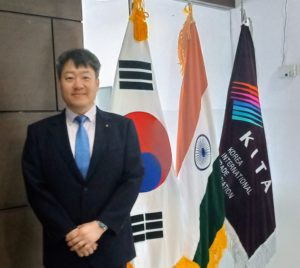[EXCLUSIVE] Koreans bring Virtue Consumption model to India, to boost demand, revive economy
These days, the shopping list of Korean expats community – individuals and companies, is getting longer and bigger as they buy more than what they require to create “Virtue Consumption”.
NEW DELHI. Even as India fights the COVID-19 pandemic that has brought its economic growth to unprecedented halt triggered by low consumption patterns and disrupted cash-flows, the Korean good Samaritans are on a rigorous buying spree to boost consumption of products and services in the country.
These days, the shopping list of Korean expats community – individuals and companies, is getting longer and bigger as they buy more than what they require to create “Virtue Consumption”.
It’s shopping for products and services not only for themselves but for others too. People pay in advance to restaurants and stores to claim the service later.

“This is a campaign that we didn’t officially start but it is very prevalent among the Korean community all over the world these days, especially in Korea. Some call it kind-hearted consumption too. It means if you have the extra money in your wallet, you buy more than you require and share it with others. You go to a restaurant in Korea, and pay not only for the meal you have but also for your next visit in advance, and buy meal vouchers,” said Hee-chul Jung, Secretary-General, Korean Chamber of Commerce and Industry in India (KOCHAM).
The Korean people are buying more groceries these days.
For example, the personal protective equipment like sanitizers, hand-washers, masks, and gloves are being bought more than an individual requires. These are shared with other people in the vicinity, with their neighbors, or those who are less-privileged – a Good Samaritan act.
 Hee-Chul Jung said it was because of the disruption in the market and consumption-levels falling low. For example, there is a problem with rent as many people cannot pay rent. This is a huge relief for service providers and seems to be holding up the domestic economy in Korea.
Hee-Chul Jung said it was because of the disruption in the market and consumption-levels falling low. For example, there is a problem with rent as many people cannot pay rent. This is a huge relief for service providers and seems to be holding up the domestic economy in Korea.
“Right now, the biggest trend in the KOCHAM community is something called ‘virtue consumption’. This is happening in Korea for some time now and we are trying to duplicate it here in India. The virtue consumption is about making additional purchases even when one doesn’t need it immediately,” he added.
While individuals buy excessive groceries, companies stack goods. This would also help them to address the issue of broken supply chain and production processes.
“Many companies are making sure they have enough components and raw material. It is a natural reaction after experiencing severe shortage during the strict lockdown. We at the KOCHAM secretariat would like to encourage this unique remedy,” said the KOCHAM Secretary-General.
In Korea, the country’s one of the biggest multinational POSCO Group and its 90 partner vendors has been promoting “good consumption” – as they call it, by making advance payments in traditional markets for vouchers to revive local economies.
According to The Korea Herald, on May 21, a total of 165 employees of the POSCO Group and its partners visited the Yeonil Traditional Market in Pohang and Jungma Market in Gwangyang and spent 20 million won ($16,500) in each market.
They bought grocery vouchers from traditional markets there to donate to the less privileged in the region.
KOCHAM’s dedicated COVID-19 Strategy and Solutions Package:
For the last few months, KOCHAM tried to become a bridge providing PPE and testing kits to over 100 hospitals throughout India. These kits to the hospitals were purchased, and KOCHAM linked manufacturers to them.
Right now KOCHAM is promoting COVID 19 prevention solutions to Korean companies in India. It is called ‘COVID 19 Package’. KOCHAM is willing to share it with Indian companies too.



